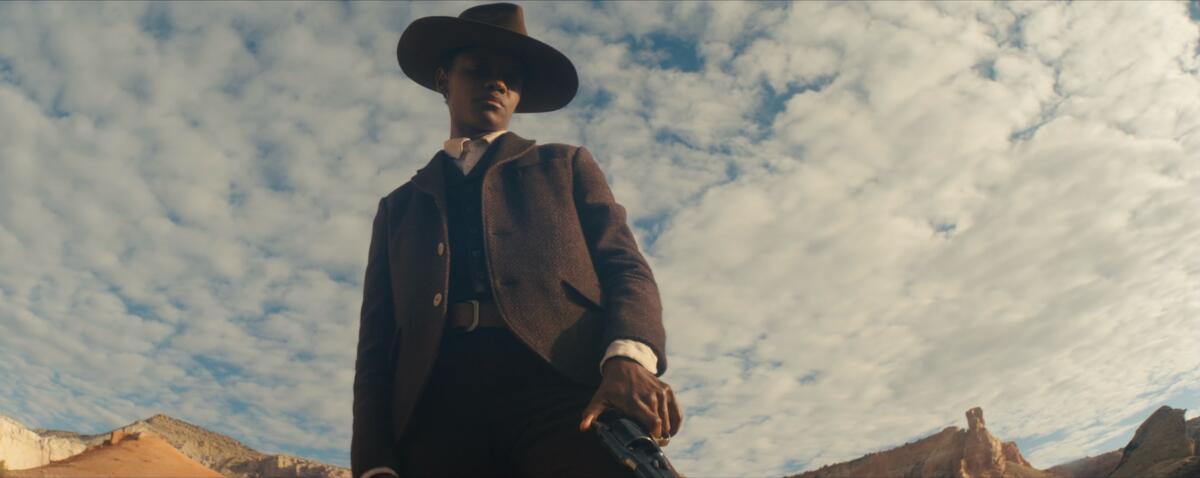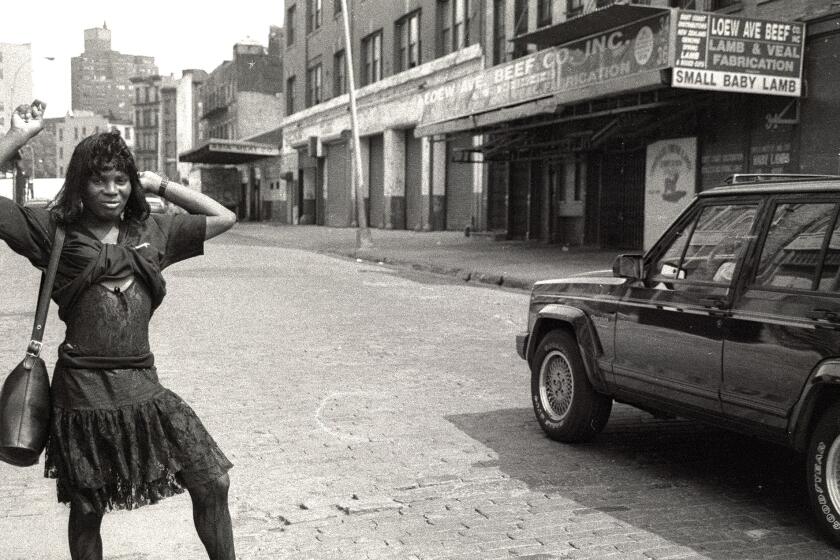Review: Letitia Wright and Jamie Bell are ‘Surrounded’ in stripped-down neo-western

- Share via
‘Surrounded’
The neo-western “Surrounded” has the kind of stripped-down premise that was common to the genre back in the 1950s, when crafty filmmakers used the backdrop of the Old West to stage intense psychodramas laced with social commentary. Early in the film, an outlaw is chained to a tree in the middle of nowhere, guarded by one person who’s reluctantly left in charge while the rest of their traveling party has ridden off to find the law. Angling for escape, the bad guy, Tommy Walsh (Jamie Bell), promises to lead his captor to a cache of stolen money, while suggesting the two of them have more in common with each other than they do with the folks who abandoned them. The reason? The person holding the gun is a Black woman, Mo Washington (Letitia Wright), who has been passing as a man ever since she signed up with the Buffalo Soldiers to free herself from slavery.
Director Anthony Mandler and screenwriters Andrew Pagana and Justin Thomas introduce a succession of supporting players to “Surrounded,” including Jeffrey Donovan and Brett Gelman as two stagecoach passengers and Michael K. Williams (in one of his final performances) as a bounty hunter who’s less sympathetic to Mo than she expects. Mandler and his crew construct some striking images too, taking advantage of the stark New Mexico landscape to frame characters cleanly against a vast expanse of nothingness.
For the most part, this movie consists of a long conversation between Tommy and Mo, discussing race, violence and their own personal versions of the American Dream. The dialogue is at times way too blunt and a bit anachronistic — as though the characters are reading from a modern textbook, analyzing the hardships and attitudes of 19th century pioneers. But Wright and Bell have a powerful dynamic, with her playing Mo as quietly ferocious and him playing Tommy as brashly theatrical. Like most westerns, “Surrounded” is about people trying to reinvent themselves on the frontier. But this is also one of those westerns with a cynical streak, where the hostility the characters are trying to escape hounds them mercilessly.
‘Surrounded.’ R, for violence and language. 1 hour, 41 minutes. Available on digital

‘Maximum Truth’
In the mockumentary “Maximum Truth,” writer-comedian Ike Barinholtz brings his overconfident dim-bulb persona to a lighthearted spoof of political dirty tricksters. Barinholtz plays Rick Klingman, a James O’Keefe/Jacob Wohl-like hustler who gets paid to drag left-wing politicians through the mud. Dylan O’Brien plays Simon, a younger and sketchier bomb-thrower, who teams up with Rick to take down a rising Democratic candidate. The two set a date for a press conference, promising to expose a career-ending scandal. Then — and only then — they scramble to confirm rumors they’ve heard about sexual harassment, drug-fueled orgies and antisemitism.
“Maximum Truth” has an impressive roster of guest stars, including Mark Proksch as a creepy whistleblower and Kiernan Shipka as a gun-toting right-wing revolutionary. And Barinholtz and his director/co-writer David Stassen — who previously collaborated on TV series “The Mindy Project” and “History of the World, Part II” — have a real understanding for how seedy and pathetic some “citizen journalist” operations can be, as they squeeze money from true believers by teasing bombshell revelations they can’t deliver.
But there’s very little about “Maximum Truth” that’s unexpected: not the jokes, not the satire, and certainly not the plot. Barinholtz and O’Brien are funny enough to keep this movie bubbling along, even when it’s low on ideas. But with its three-part structure — as Rick and Simon follow three distinct tips about their enemy’s nonexistent malfeasance — the film feels too much like an extended proposal for a TV show. It’s more set-up than punchline.
‘Maximum Truth.’ R, for language and some sexual content. 1 hour, 27 minutes. Available on VOD; also playing theatrically, Laemmle Monica, Santa Monica
‘The Perfect Find’
The charming and versatile Gabrielle Union has been in a lot of comedies and romances throughout her career, though usually as part of an ensemble. She’s in a big cast again in “The Perfect Find” — a romantic dramedy set in the New York fashion and publishing industries — but this time Union’s at the center, where she belongs. She plays Jenna Jones, a former rising star in style and beauty journalism, trying to rebuild her life after her career and relationship have collapsed. Jenna ends up working for a former rival, Darcy (Gina Torres), but finds her new job in jeopardy when she falls for a younger colleague, Eric (Keith Powers), who happens to be Darcy’s son.
Based on a Tia Williams novel (adapted to the screen by writer Leigh Davenport and director Numa Perrier), “The Perfect Find” is, for the most part, fairly generic. The fashion world backdrop, the heroine’s self-consciousness about her public image, the secrets that are inevitably exposed — it’s all very familiar. But the New York locations are varied and well-chosen; and the supporting players (especially Aisha Hinds as Jenna’s supportive friend) add personality. More than anything, “The Perfect Find” is a strong showcase for Union, who gets to play a lot of notes as Jenna: funny, sexy, anxious, nostalgic, inspired. Even when the movie is too plain, its star is something special.
‘The Perfect Find.’ TV-MA, for language. 1 hour, 39 minutes. Available on Netflix
Also on streaming and VOD
“The Stroll” is a decades-spanning look at the history of sex work in New York’s Meatpacking District, where trans women were able to make money, explore their sexuality openly and find a community — until police harassment and gentrification drove them away. Co-directors Kristen Lovell (who once worked those streets) and Zackary Drucker speak frankly with some of the women who lived through both the good times and the bad. With the help of some vivid old photographs, their documentary reconstructs a world that was both darkly dangerous and strangely liberating. Available on Max
‘The Stroll,’ premiering Wednesday on HBO and Max, is part of a wave of recent films to reconstruct LGBTQ+ stories from unexpected sources.
“I’ll Show You Mine” is what the showbiz trades call “a two-hander,” featuring just a couple of actors: Poorna Jagannathan, playing a bestselling memoirist, and Casey Thomas Brown playing her nephew, a pansexual icon she’s interviewing for a book about trauma and sexual confidence. Directed by Megan Griffiths from a screenplay by Tiffany Louquet, Elizabeth Searle and David Shield, the movie dramatizes one long, intimate conversation, as these two share stories and try to dig beneath each other’s aloof public personas. Available on VOD
More to Read
Only good movies
Get the Indie Focus newsletter, Mark Olsen's weekly guide to the world of cinema.
You may occasionally receive promotional content from the Los Angeles Times.











